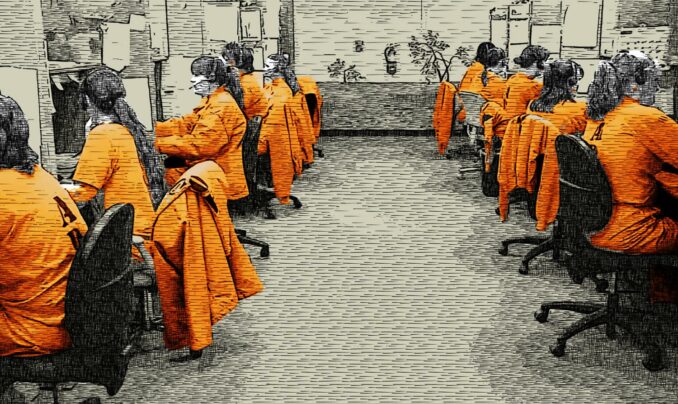How prison labor works in Arizona
The following article was excerpted from an Arizona Republic and KJZZ News July 22 investigative exposé revealing “what happens when a state exploits some of its poorest people for their labor.” Full story at tinyurl.com/2p8ffmnn.

Incarcerated women prisoners doing telemarketing. (Photo Credit: Merry Eccles/USA Today Network)
After 15 months of gathering and analyzing more than 11,000 documents and building a computer program that downloaded tens of thousands of public profiles about prisoners — that the Arizona Department of Corrections refused to provide — reporters at the Arizona Republic and KJZZ News found that prison labor during the past 10 years has become ubiquitous across the state.
Prison work, for example, is in places that many people would never have realized: Prisoners make the custom woodwork at hip bowling alleys; they construct trusses, cabinets, wall frames at well-known private home developments and luxury apartment buildings; they work inside kennels for pet adoption shelters; they build confessionals in churches; they act as janitors and groundskeepers at schools — but are told to keep out of sight of staff and students so no one knows they’re there.
Many prisoners say they enjoy the jobs, if only because it gets them out into the free world and gives them something to do. The biggest problem: They are often paid less than $1 an hour. And despite the misconception that everything in their lives is paid for, prison life is really quite expensive. Prices for goods are about the same as in the outside world. From pens and paper to envelopes and stamps, it could take a full week for some prisoners to buy what they need to send a single letter to a family member by mail.
There are about 2,000 prisoners who are meant to get paid more. These elite members of the incarcerated population work for Arizona Correctional Industries, a state-run company under the auspices of the Department of Corrections, Rehabilitation and Reentry.
Prisoners at ACI do two things: They either make products for sale to government entities and private businesses, or they are leased out to private companies that have trouble finding workers for jobs that few people in the free market would be willing to do.
Despite their higher pay, prisoners who work for ACI don’t get to keep it all. Far from it. The state takes large chunks from their paychecks, forcing them to pay room and board, utilities and other expenses. In some cases, prisoners pay upward of $700 a month to live in their own cells.
The Department of Corrections contends that the money helps offset the costs of incarceration, and ACI’s jobs help prisoners get work after they are released. As to the deductions from prisoner paychecks, ACI said it’s not responsible for those, since state law requires the Department of Corrections to remove that money.
Even before Arizona was a state, prisoners were mandated to work while riding out their sentences. The idea was to save the government money — not to help private companies turn a profit.
‘Convict leasing’ again in 1995
That changed in 1995 when ACI began quietly leasing out its captive workforce to a select group of farms, manufacturers and telecommunications companies. . . . While prisoners once obtained woodworking, metalworking, upholstery and other useful skills working at the ACI’s manufacturing shops, an increasing number were now farmed out to private companies, often at the expense of their health.
Prisoners often get paid pennies on the dollar to perform tasks inside of the prison such as to mop floors, rake the yard or do agriculture work. When an opportunity comes to do the same job outside prison for a small bump in pay, the majority interviewed said they gladly made the move.
But working on the outside of prison comes with its own complications, such as being strip-searched every day, being degraded in public by being forced to line up and have drug dogs sniff their rear ends, or working in intense heat for hours and then threatened by corrections officers for taking breaks when they’re tired.
The Republic and KJZZ found multiple prisoners who reported injuries that were not recorded by the Department of Corrections and also hadn’t been properly treated. Some of them will never be able to work again. But they are not entitled to workers’ compensation or unemployment, because they were incarcerated at the time of their workplace injuries.
The Department of Corrections contends that it and its private partners are required to follow all federal Occupational Safety and Health Administration standards. But when asked about particular incidents, the Department of Corrections did not provide evidence of any reports that had been done to ensure prisoner health and safety at any locations where prisoners worked.
The study also showed consistent racial disparities in hiring patterns among well-paying jobs at many of the state’s more high-profile companies that use prison labor.

